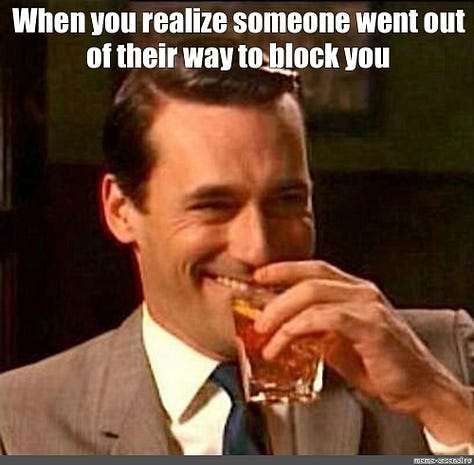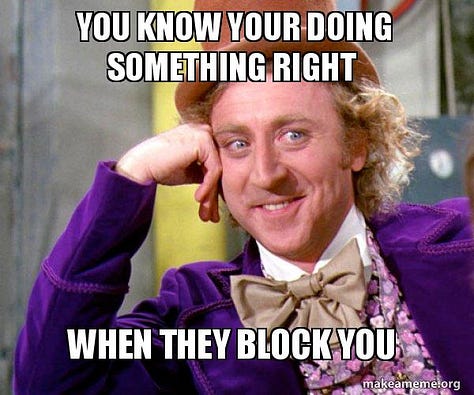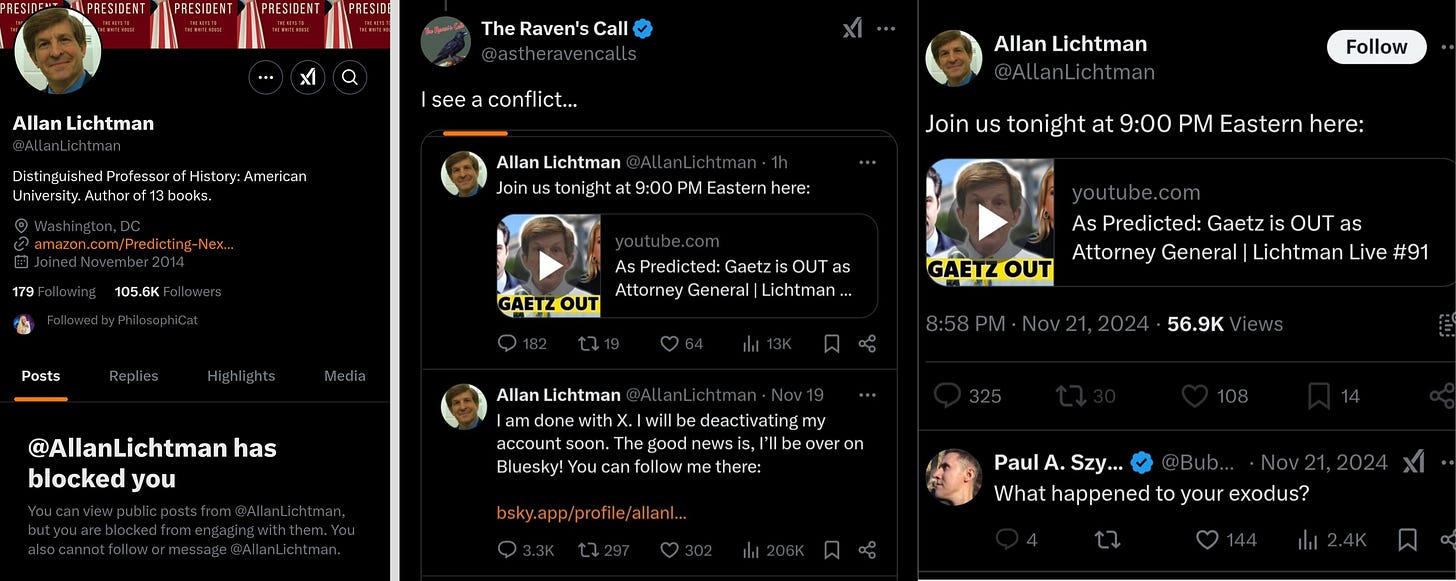Embrace the Power of Blocking
Thoughts and Considerations on When to Block People On Social Media
And midway through typing yet another trollish or incredibly stupid reply, the block feature stopped him dead in his tracks.
◊
Anyone who uses various platforms on social media but twitter in particular is invariably confronted with the difficult and at times surprisingly complex question as to when exactly another person’s behavior warrants blocking. Blocking prevents that person from interacting with one’s tweets and, until very recently, used to prevent that person from viewing the blocking account’s profile or content at all. Some instances obviously warrant blocking, such as spam and bot accounts, unsolicited pornographic or gore content, some of which is of course banned and in some instances illegal. Other obnoxious or undesirable behavior is more ambiguous, with differing schools of thought on whether banning is the best option. Much of this decision of course hinges on follower account and whether interactions can boost or hinder an account’s visibility and follower count.



It is at times hard to imagine we live in a society where people routinely boast about being so obnoxious, stupid, or loathsome others are routinely obliged to block them.
One important consideration is that many are somehow convinced that being so obnoxious that it prompts others to block someone is something to be proud of or boast about. Very often accounts will post screenshots indicating that another has blocked them, as if that were some sort of trophy or prize. In some very limited instances, this is at least somewhat understandable. Such instances principally pertain to those who, rightly the subject of ridicule, cannot take any criticism or negative feedback, so they just block. One notable example is Professor Allan Lichtman—the pundit recently humiliated for falsely predicting a Biden (or Harris) win this past November and for a disastrous appearance on Piers Morgan. He announced leaving twitter for bluesky before coming back almost instantly, and was roundly mocked for it. Yours truly responded to his tweet, reminding the public of how quickly this pompous, arrogant twit changed his mind.
For this, he blocked my humble, fledgling account. Blocking in such an instance is definitely “weak sauce.” Sometimes accounts get blocked despite not having had any interaction at all. Particularly before the Elon Musk era, leftists in particular were known to resort to block lists. These block lists can be quite expansive. Transgender freak Alexander Caballero was notorious for them as was, curiously enough, Lindsay Ellis before she was hoisted by her own petard and ran off twitter and YouTube for making an innocuous remark that incurred much ire from the rank-and-file wokester goblin. It was curious indeed to learn she blocked my account, to say nothing of disappointing, as I have never interacted with her. And even though her politics are absolute shit, she does now and then make an interesting observation about this or that element in popular culture.
As demonstrated by searching “block” or “blocked” with the filter “from:@taradublinrocks” on twitter, infamous left-wing personality simultaneously holds two contradictory positions regarding blocking. On one one hand she regularly blocks—and tweets about blocking—any smaller account that she disagrees with, often falsely accusing the account holder of being Russian bots. By the same token, she regularly posts screenshots bragging about prominent conservative, right-of-center, and far-right accounts blocking her, never considering that they block her because she is insane. She has been a regular subject on 4chan and certain other platforms on the Internet regarding her various unhinged antics, including writing a self-published book about her unrequited infatuation—or rather obsession—with Dave Grohl.
The question thus arises, when is it prudent or beneficial to block someone, and when are other alternatives a better choice? The faculty of discrimination is an important one, and it is vital to apply this very faculty of discrimination in regards to others a person wisely chooses not to interact with. It is a pity that the word “discrimination” has been corrupted and stigmatized with decades of propaganda touting the civil rights era as an unmitigated good, to say nothing of manic delusions about race and diversity. Together, these nefarious elements, so deeply engrained in the fabric of American consciousness, have created a sort of Pavlovian response at the mere utterance of the words “discriminate” and “discrimination.” But just as these words and concepts must be liberated from the negative connotations that they have so wrongly been tainted with, it is an outright travesty that individuals cannot exercise this most essential faculty of discrimination in any number of areas of public life. Not everyone is entitled to my time, or my thoughts, or my consideration. While citizens have little discretion as to who they serve in various enterprises or who they want to hire, we do still have the right not engage with those who have nothing to offer. And that is why I for one embrace the power of blocking the ignorant, obnoxious, and stupid.
There are several circumstances that warrant this quick and easy remedy: circumstances which can be repeatedly observed time and time again. As a general rule, it is always advisable to block other accounts for just being insufferable, either by use of petty or abusive insults, or engaging in strawman or other dubious arguments. Often times, people will not just proffer a bad or specious argument. Rather, after being curtly rebuffed, very often people will reiterate the same thing over, and over, and over again, to mention nothing of other behavior that is simply a waste of time, energy, and thought. Other times, small or uninteresting accounts badger and needle others with other sorts of the most pointless drivel, either with questions that can be easily answered with a cursory internet search or make other statements that exhibit the most astounding and appalling ignorance. One such example of the latter would be a statement that a President should pardon someone convicted under state law, which by now most know, or should know, is not possible as the President’s pardon power only extends to federal charges.
Other sorts of the most exasperating, insufferable behavior abound—behavior that so richly deserves the liberal application of the block feature. Insisting on something once it has been made clear that asserting the same unconvincing argument remains unpersuasive only serves to demonstrate that further dialogue is pointless. If, after briefly glancing whatever ridiculous screed or tirade some random person has subjected me to, I have stated in response that I have considered his suggestion or argument and that I remain unconvinced, that should be the end of the matter. What should be the final retort is usually some variation of this statement; I have considered your arguments, and I decline. To be sure, a response asserting a new or novel suggestion not before considered can make the exchange interesting or worthwhile. But all too often the person not only continues, but repeats the same or nearly the same arguments that was just considered and rejected. And that is where the block comes in.
A few words that exemplify the essence of the faculty of discrimination and the importance to not be bothered by that which no one should want to hear. By invoking the death of the author, or in the instance of cinema, the death of the director, one is able to ascertain a much more enlightened lesson from the anti-white Quentin Tarantino film, Django Unchained. That real life lesson is that the Australian fellow needed to abide by instinct and his better judgment. The black, Django, did not, in fact, have anything to say that he wanted to hear.
A recent exchange I saw concerned a Redskins fan stating he hopes the NFL team in Washington loses so long as it uses its current moniker “The Commanders,” explaining he hated the new name and the uniforms, and that being a Redskins fan, he could never support something that had betrayed the very essence and name of his former passion. Some random, very low-follower account chimed in stating “you aren’t a real fan, a real fan would support his team no matter what.” He of course did not say a real Redskins fan would support the team no matter what. The disaffected Redskins fan briefly rebutted this statement, explaining he is a Redskins fan in particular, and not a vague fan of any NFL team that happens to play in the Washington DC area, and that he objects to the NFL and the new owners cow-towing to pressure to change the name in the wake of the George Floyd riots of 2020 and the nefarious Black Lives Matter movement. And instead of accepting that response, or responding to the Redskins fan with other, novel considerations not stated theretofore in the exchange, the person just reiterated pretty much exactly the same thing he had already stated. The only sensible thing to do is to get off that merry-go-round. And there is no better way to get off that merry-go-round than by blocking. When a broken record skips, stop the music and throw it in the trash.
As stated, often times people will feel a sense of triumph, so blocking comes with the realization that such perverse individuals are likely to get an endorphin rush from being so insufferable as to oblige others to block them. But the alternative is to stay on that merry go around. And around and around and AROUND it will go, and where it stops, nobody knows—that is if one fails to discern how wise, prudent, and powerful the application of the block feature is.
If a person is not careful, he may find a pointless, obnoxious, or otherwise counterproductive exchange seemingly never ends. The block feature offers an escape from that ride that may otherwise never end.
Another option is to of course mute an obnoxious or trolling account. This prevents screenshot trophies evidencing the decision to block, although usually I inform someone has been muted because I do not want to be bothered with multiple additional replies that I am not privy to but that everyone else can see. Such a half-measure would be akin to being at a cocktail party or other gathering where I am able to mute someone who has alienated, insulted, or otherwise antagonized me, but everyone else in the room can hear what he is saying in my midst. Quite happily, usually indicating a person has been muted is sufficient deterrence to prevent further unwanted responses.
For those trying to increase engagement, as most are, the best tactic may hinge on the offending account’s follower account. It is of course sad and pathetic that social proof is so important in social media, but it is just how things are. After all, many—even sophisticated and otherwise interesting, insightful, intelligent people—regard so-called ratioing[1] as a useful barometer to determine who wins and loses a debate on twitter. A pithy, well thought out response can get more engagement in response to a prominent account or an influencer, although it also entails the risk of mindless drones of followers to dogpile. A pithy response or interesting meme followed by a conscious decision to not engage further or simply muting or select the recently introduced option of “leaving the conversation” (which prevents further replies in that particular exchange) are also excellent choices in those situations where an offending account has a decent or high follower count.
These considerations notwithstanding, most would agree they probably spend too much time on social media and on the Internet generally. A more liberal application of the block feature is an excellent tool to help mitigate this tendency. When people demonstrate that they have nothing to say, at least nothing that I want to see or hear, why indulge them further? Blocking helps ensure I do not waste another precious second being subjected to more of the same. Society, particularly American society, has too many stupid, ugly, or otherwise despicable people. As Boyd Rice laments, it is regrettable something more drastic cannot (yet) be done to these people, “to make them suffer as they have made us suffer.” Until such time, disengaging and blocking is the best available antiseptic. Consider such an antiseptic as a sort of hygiene for the use of one’s time, mind, and thoughts. When considered in that light, we discern just how underutilized the block feature is.
[1] For those unaware, ratioing is the practice of responding to a tweet disputing or disparaging the person or claim in that tweet. That reply has “ratioed” the tweet to which it has replied when it gains a higher number of likes. During the H1B visa fiasco, Elon Musk was routinely getting ratioed by those who rightly balked at his untenable position. Sometimes ratioing can demonstrate that the reply wins an argument, but often times it is just a popularity contest. OnlyFans thots will often ratio those critical of them, wielding sizeable masses of “simps” and “coomers.”








